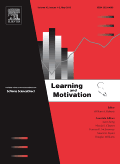
LEARNING AND MOTIVATION
Scope & Guideline
Fostering Understanding of Motivational Dynamics
Introduction
Aims and Scopes
- Interdisciplinary Research on Learning and Motivation:
The journal encompasses studies from psychology, education, neuroscience, and behavioral sciences, focusing on how motivational constructs influence learning processes and outcomes. - Empirical and Experimental Approaches:
Research published in this journal often employs rigorous empirical methods, including experiments, longitudinal studies, and meta-analyses, to explore the dynamics of learning and motivation. - Application of Theoretical Frameworks:
The journal promotes the use of established theoretical frameworks, such as self-determination theory, cognitive load theory, and constructivist principles, to analyze and interpret findings related to learning and motivation. - Focus on Diverse Learning Contexts:
Studies address learning in various contexts, including formal education, online learning environments, and animal models, providing a comprehensive view of motivational influences. - Influence of Emotional and Social Factors:
Research often investigates how emotional states, social interactions, and contextual factors impact motivation and learning, highlighting the complexity of these relationships.
Trending and Emerging
- Integration of Technology in Learning:
There is a strong trend towards investigating the role of technology, including gamification, online platforms, and multimedia resources, in enhancing motivation and learning outcomes. - Focus on Emotional and Social Dimensions:
Research increasingly emphasizes the interplay between emotional regulation, social dynamics, and motivation in learning environments, reflecting a growing understanding of the affective aspects of education. - Self-Determination Theory Applications:
Studies are increasingly applying self-determination theory to explore how autonomy, competence, and relatedness influence motivation and learning, particularly in educational settings. - Collaborative and Cooperative Learning:
There is a rising interest in collaborative learning strategies and their impact on motivation, engagement, and learning outcomes, recognizing the importance of social interactions in educational contexts. - Resilience and Well-Being in Learning:
Emerging research focuses on the role of resilience, well-being, and mental health in learning processes, highlighting the importance of supporting students' psychological needs for effective learning.
Declining or Waning
- Traditional Learning Methodologies:
There has been a noticeable decrease in studies focusing solely on traditional learning methods without integrating technology or innovative practices, as the field increasingly embraces digital and hybrid learning environments. - Behavioral Approaches to Learning:
Research centered on purely behavioral models of learning, such as reinforcement schedules and classical conditioning, appears to be declining in favor of more holistic approaches that consider cognitive and emotional factors. - Static Assessments of Learning Outcomes:
There is a waning interest in static assessments of learning outcomes that do not account for dynamic changes in motivation or contextual influences, with a shift towards more comprehensive and longitudinal assessments. - Overemphasis on Individual Differences:
While individual differences in learning and motivation remain important, there is a trend away from studies that focus excessively on personality traits or demographic factors without considering broader contextual influences. - Animal Research Models:
Although animal studies have contributed valuable insights, there is a noticeable decline in the publication of such research compared to studies directly involving human learning contexts.
Similar Journals

Decision-Washington
Innovative Research for Informed Decision-MakingDecision-Washington, published by the Educational Publishing Foundation in collaboration with the American Psychological Association, is a notable journal in the fields of Applied Psychology, Neuropsychology, Social Psychology, and Statistics. With an ISSN of 2325-9965 and an E-ISSN of 2325-9973, this journal offers a platform for the dissemination of impactful research and innovative methodologies. Since its inception in 2014, it has swiftly progressed through its converged years and established itself in the Q2 quartile of its fields as of 2023, indicating its rising influence and recognition among peers. Researchers and professionals alike benefit from its rigorous peer-review process and the respected reputation of its publisher, ensuring high-quality content that contributes significantly to ongoing academic discourse. While it currently does not offer Open Access options, the journal's comprehensive resources and findings enhance both theoretical understanding and practical applications in psychology and decision sciences.
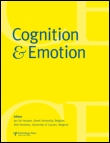
COGNITION & EMOTION
Unraveling the Complex Tapestry of Cognition and EmotionCOGNITION & EMOTION is a leading academic journal published by Routledge Journals, Taylor & Francis Ltd, focusing on the dynamic interactions between cognitive processes and emotional responses. Established in 1987, this esteemed journal has made significant contributions to the fields of Arts and Humanities, Developmental and Educational Psychology, and Experimental and Cognitive Psychology, consistently ranking in the top quartile (Q1) across various categories. Housed in the United Kingdom, COGNITION & EMOTION boasts a remarkable impact factor, underscoring its influence and importance in advancing psychological research and theory. While this journal does not offer open access, it remains a vital resource for scholars, professionals, and students seeking to deepen their understanding of emotional and cognitive phenomena. With a commitment to rigorous peer-reviewed research and innovative insights, COGNITION & EMOTION is essential for anyone aiming to stay at the forefront of psychological studies.

CONTEMPORARY EDUCATIONAL PSYCHOLOGY
Exploring the Nexus of Learning and DevelopmentCONTEMPORARY EDUCATIONAL PSYCHOLOGY, published by Academic Press Inc. Elsevier Science, stands as a leading journal in the fields of developmental and educational psychology. With an impressive impact factor and ranked in the Q1 category for both Developmental and Educational Psychology and Education, it is recognized as a top resource for researchers and professionals seeking to explore the complexities of learning, development, and educational practices. The journal has been disseminating groundbreaking research since 1976 and continues to be relevant through 2024, showcasing innovative studies that inform educational theory and practice. Although the journal operates under a subscription model, it provides unparalleled insights and comprehensive reviews that cater to a diverse audience, including researchers, educators, and students. The rigorous peer-review process guarantees the high quality of published work, while its Scopus rankings affirm its significant contribution to the academic community, with standout positions in both the fields of social sciences education and developmental psychology. For those committed to advancing the intersection of psychology and education, CONTEMPORARY EDUCATIONAL PSYCHOLOGY is an indispensable scholarly resource.
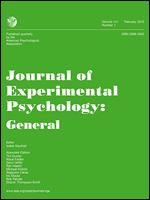
JOURNAL OF EXPERIMENTAL PSYCHOLOGY-GENERAL
Advancing the Frontiers of Psychological ResearchJOURNAL OF EXPERIMENTAL PSYCHOLOGY-GENERAL, published by the American Psychological Association, is a leading journal in the field of experimental and cognitive psychology. With an ISSN of 0096-3445 and a robust impact factor that reflects its significant contribution to research, this journal serves as a premier outlet for empirical studies that advance our understanding of psychological processes across development and cognition. Covering a wide array of topics from developmental neuroscience to general psychology, it is categorized in the Q1 quartile across multiple fields, making it a vital resource for researchers, professionals, and students alike. The journal has maintained a consistent publication record since its inception in 1975, continuously freeing insights that shape the future of psychology and related disciplines. With rigorous peer review and high standards of scholarly excellence, JOURNAL OF EXPERIMENTAL PSYCHOLOGY-GENERAL remains an essential platform for disseminating innovative psychological research.

Social Psychology of Education
Empowering educators with cutting-edge social psychological insights.Social Psychology of Education is a prestigious academic journal published by Springer, dedicated to advancing the understanding of social psychological processes within educational contexts. With an ISSN of 1381-2890 and an E-ISSN of 1573-1928, this journal has established its prominence in the field, evidenced by its Q1 rankings in multiple categories, including Developmental and Educational Psychology, Education, Social Psychology, and Sociology and Political Science for 2023. It ranks within the top percentiles of Scopus listings, reflecting its influential impact on the research community. Spanning from its inception in 1996 to the present, this journal aims to publish high-quality, empirical, and theoretical studies that explore the intersection of social psychology and education, fostering a deeper understanding of how social factors affect learning environments and educational outcomes. Although it does not currently offer open access, researchers, professionals, and students leverage its findings to inform practice and policy-making in educational settings. Located in Dordrecht, Netherlands, the journal continues to be a vital resource for those interested in educational psychology and sociological perspectives on learning.

International Journal of Cognitive Research in Science Engineering and Education-IJCRSEE
Advancing cognitive insights for educational excellence.International Journal of Cognitive Research in Science Engineering and Education (IJCRSEE) is a prominent open-access journal that has been serving the academic community since 2013. Published by the Association for Development in Science Engineering and Education in Serbia, the journal focuses on the interdisciplinary fields of cognitive neuroscience, educational psychology, and experimental psychology. With an ISSN of 2334-847X and an E-ISSN of 2334-8496, IJCRSEE publishes cutting-edge research aimed at fostering dialogue and insights among researchers, educators, and practitioners. The journal holds a respectable position in the Scopus rankings, outlining its relevance in the fields of education and cognitive research, particularly noted for its Q4 category ranking in 2023. As it moves towards innovation and collaboration, IJCRSEE invites submissions that explore the cognitive dimensions of learning and teaching, bridging theory and practice to enhance educational outcomes. Researchers, professionals, and students alike will find in IJCRSEE a valuable resource that contributes significantly to the ever-evolving landscape of cognitive science and education.
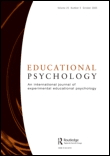
Educational Psychology
Transforming education with cutting-edge psychological insights.Educational Psychology is a leading peer-reviewed journal published by Routledge Journals, Taylor & Francis Ltd, dedicated to advancing the field of educational and developmental psychology. With its ISSN 0144-3410 and E-ISSN 1469-5820, this esteemed journal provides a platform for innovative research and critical discussions that explore the psychological aspects of learning processes, educational interventions, and cognitive development. Recognized for its quality, it holds an impressive Q1 category ranking in various fields, including Developmental and Educational Psychology, and is ranked in the top 10% of its category in Social Sciences Education and Experimental Psychology according to Scopus Metrics. Spanning from 1981 to 2024, the journal not only publishes rigorous empirical studies but also theoretical articles that contribute significantly to the understanding of educational practices globally. Researchers, educators, and students alike will find this journal an invaluable resource for cutting-edge developments in the intersection of psychology and education, enhancing their academic pursuits and professional growth.

Journal for the Study of Education and Development
Empowering educators with cutting-edge findings.The Journal for the Study of Education and Development, published by SAGE Publications Inc, is a leading academic peer-reviewed journal dedicated to advancing knowledge in the fields of educational and developmental psychology. Established in 1978 and operating through the United Kingdom, this journal provides a platform for contemporary research, theoretical discussions, and critical reviews that inform practices and policies in education. With an H-index reflecting its impact and citation metrics, it ranks in the Q3 category for both Developmental and Educational Psychology and Education as of 2023. Notably, it holds a Scopus rank of #722/1543 in Social Sciences - Education and #218/360 in Psychology - Developmental and Educational Psychology, placing it in the 53rd and 39th percentiles, respectively. The journal is committed to open access, ensuring that the insights found within its pages are readily available to researchers, professionals, and students alike. By contributing to ongoing dialogues and innovations in educational contexts, the Journal for the Study of Education and Development remains an essential resource for those looking to foster growth and development in educational settings.
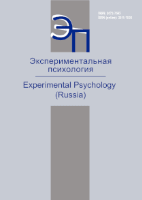
Eksperimentalnaya Psikhologiya
Advancing the frontiers of psychological research.Eksperimentalnaya Psikhologiya is a prominent open-access journal published by the Moscow State University of Psychology and Education, dedicated to advancing the field of psychology. Since its inception, the journal has offered a platform for the dissemination of innovative research in Experimental and Cognitive Psychology, as well as Neuropsychology and Physiological Psychology. The journal's commitment to open access, initiated in 2015, ensures that valuable research findings are freely available to scholars and practitioners worldwide. Although currently categorized in the Q4 quartile for 2023 within several psychology disciplines, it plays a vital role in promoting a diverse range of psychological studies and fostering interdisciplinary collaboration. With a focus on experimental methodology and cognitive processes, Eksperimentalnaya Psikhologiya provides a valuable resource for researchers, professionals, and students seeking to deepen their understanding of psychological science. The journal invites contributions from across the globe, particularly in the evolving landscapes of experimental techniques and neuropsychological research.

Revista de Psicodidactica
Bridging Theory and Practice in Psychology EducationRevista de Psicodidactica, published by ELSEVIER ESPAÑA, is a leading academic journal dedicated to the fields of Developmental and Educational Psychology. With an impressive impact factor reflecting its high-quality research, the journal has achieved a commendable Q2 ranking in its field for Developmental and Educational Psychology and a Q1 ranking in Education as of 2023. Notably, it holds a significant position in Scopus Ranks, placing in the top 90th percentile in Social Sciences Education and the 84th percentile in Psychology. Launched in 2005, the journal is committed to advancing knowledge in educational practices through empirical research and theoretical frameworks. It provides a vital platform for researchers, educators, and students in Spain and beyond, fostering an open exchange of ideas and innovative approaches to learning and development. Though it is not an open-access publication, it remains a compelling source of contemporary findings for those invested in enhancing educational outcomes.